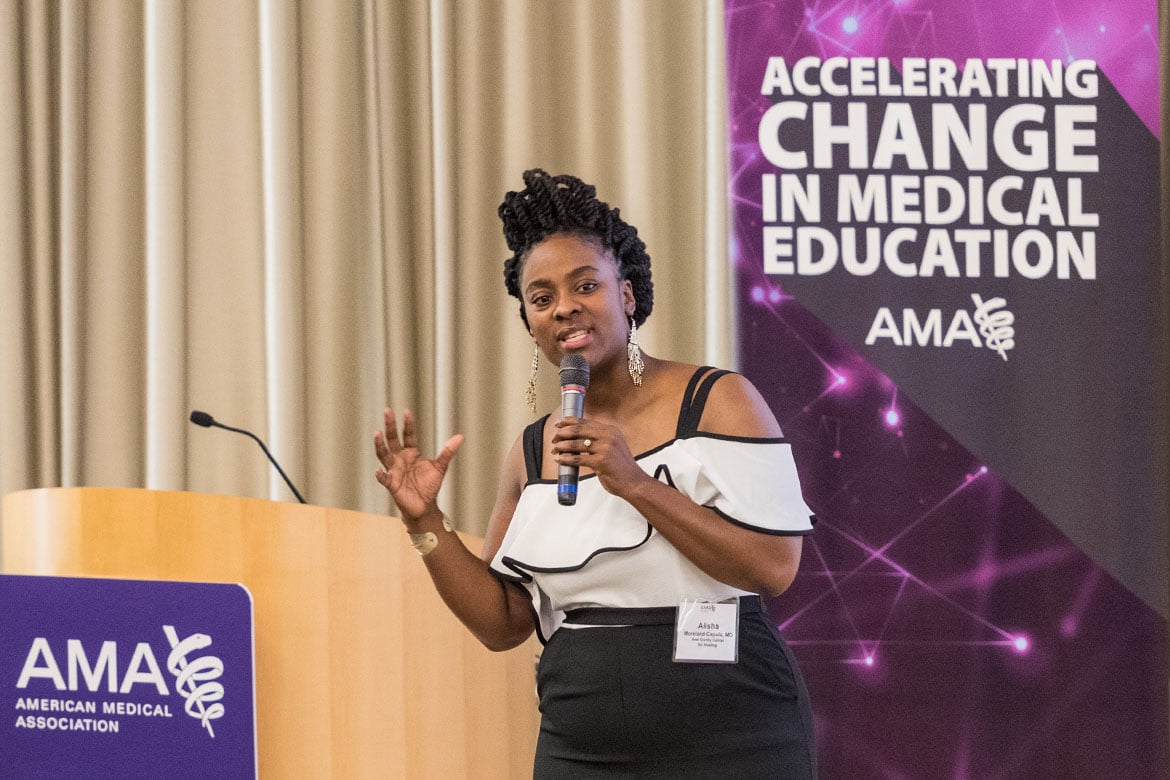The role students play in medical education should go beyond learning and listening, Alisha Moreland-Capuia, MD, said in her keynote address during the Accelerating Change in Medical Education Student-Led Conference on Leadership in early August.
“There’s an idea that the collective, or the strength of any academic institution, lies within its medical students, residents and trainees,” said Dr. Moreland-Capuia, the executive director at the Avel Gordly Center for Healing and an assistant professor of psychiatry at Oregon Health and Science University. “And it behooves every academic institution to tap into the leadership capacity of each and every one of its medical students because the return on investment is great.”
In a speech entitled, “Learning to lead from where you are,” Dr. Moreland-Capuia said there is room for leadership at any level within an institution and community.
She speaks from experience. As a fourth-year resident, Dr. Moreland-Capuia developed Healing Hurt People Portland, a hospital-based violence-intervention program. The program works with young males of color who have been stabbed or shot, coaching them to turn their lives around after they are wounded.
“To develop this program as a fourth-year resident, to be given the time, that’s true project-based learning,” Dr. Moreland-Capuia told an audience of medical students and faculty members. “I had to work with hospitals, politicians, the county, the state. There were a number of collective partners. What it ended up doing was building this huge collaborative of people wanting to learn more about what trauma is and how they can be a part of the discussion. That was my fourth year in residency. So this is well within your reach.”
Starting early
Dr. Moreland-Capuia’s community leadership efforts date back to her time as a medical student at George Washington University School of Medicine. Starting early in her career was a vital part of her success, she said.
“While in medical school, I actually served on several boards,” she said. “In my third year of medical school, I went to my administration at the time and I said, ‘I really feel that in order for me to be a good leader as a physician, this is the type of support I need. I need to be able to be on a board, learning from the community and also giving back to the community. This is what’s going to make me a better leader, a better physician and a better person.’ And my administration at the time said, ‘Absolutely.’
“Serving on boards is vital and critical and if you’re not already doing it,” Dr. Moreland-Capuia said. “It’s something each medical student should examine at some point. Between four and six hours a month might seem like a long time, but it really isn’t when you think about the impact that you can have by just being present.”
Dr. Moreland-Capuia is a believer in “spontaneous compassion,” which she defines as seeing a need and meeting it. As a faculty member, she has observed that most students pursuing a future in medicine possess that trait in abundance.
“Don’t be so quick to outsource your gifts, talents and sense of self-worth to others,” she said. “Recognize your own power. Everything you already need for leadership and the capacity to lead you already have.”
Dr. Moreland-Capuia’s address was among dozens of presentations and workshops that took place during the student-led conference. Co-hosted by the University of Michigan Medical School and the AMA, the theme of the conference was “Learn, Connect, Empower, Impact.”




